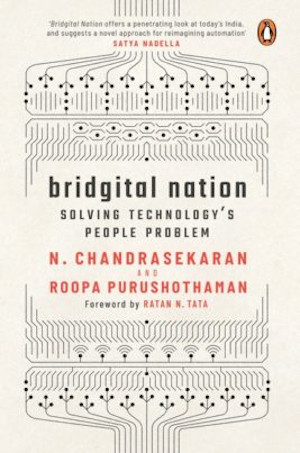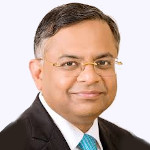Book Review: Bridgital Nation - Solving Technology's People Problem by N. Chandrasekaran and Roopa Purushothaman

Manickavasagam, or Vasagam for short, graduated as a civil engineer in 1964. He joined the Indian Army in 1965 and became a 'Fauji'. During his career with the armed forces, he served in Leh, Ladakh and Poona (now Pune).
Vasagam joined Indian Revenue Service (Customs and Central Service) in November 1971. Switching over from olive green to civvies was difficult initially but time was a healer. Upon superannuation, he joined the Central Administrative Tribunal and served for the 5 years and 9 months as Administrative Member.
Vasagam is a prolific writer and has already penned three novels in Tamil and hopes to finish the fourth essay within a year. He headed a team which produced a CD-ROM on the life and teachings of Adi Sankara.
These days, Vasagam is leading a retired life with his spouse. His elder son is a computer engineer who lives in America while the younger one is based in Bengaluru. Vasgam is blessed with two grandchildren.
About the book

Title: Bridgital Nation : Solving Technology's People Problem
Author: N. Chandrasekaran and Roopa Purushothaman
Publisher: Penguin Random House India
Publication: 2019
Language: English
ISBN-13: 978-0670093366
Pages: 344 (Hardback)
Price: Rs. 799
Website: https://penguin.co.in/book/uncategorized/bridgital-nation/
Description
It is 2030. India is among the world's top three economies. All Indians use the cloud, artificial intelligence and automated learning to either do their job or get their job done. All Indians have access to quality jobs, better healthcare and skill-based education. Technology and human beings coexist in a mutually beneficial ecosystem.
This reality is possible. It is within reach. With Bridgital.
In this groundbreaking book, the chairman of Tata Sons, N. Chandrasekaran presents a powerful vision for the future. To the coming disruption of artificial intelligence, he proposes an ingenious solution, where India is perfectly positioned to pave a unique path from the rest of the world. Instead of accepting AI as an inevitable replacement for human labour, India can use it as an aid; instead of taking them away, AI can generate jobs.
Chandrasekaran and his co-author, Roopa Purushothaman, survey the country for inspirational stories of resilience and determination, and seek the ideal way to bring Indians closer to their dreams. Through on-ground application of the dynamic technology called 'Bridgital', they show how Indians can be connected across the country, creating a network of services to be delivered where they are most required. This brilliant, cutting-edge solution will address India's biggest challenges by bridging the huge chasm between rural and urban communities, the different levels of education and medical access, and between aspirations and achievement. From healthcare to education to business, the model can be applied in various sectors, and, by a conservative estimate, it can create and impact 30 million jobs by 2025.
One of the country's foremost industry leaders and pioneers, N. Chandrasekaran brings his expertise of over thirty years with the Tata Group to offer a blueprint for building a prosperous India, where everyone is included in the growth story.
Authors

Natarajan Chandrasekaran is chairman of the Board of Tata Sons, the holding company and promoter of more than 100 Tata operating companies. Prior to this he was the chief executive officer of Tata Consultancy Services (TCS), a leading global IT services provider and one of India's most valuable companies. He is also a director on the Board of the Reserve Bank of India.

Roopa Purushothaman is the chief economist and head of policy advocacy at the Tata Group, and the founder of Avasara Leadership Institute. A co-author of the path-breaking 2003 Goldman Sachs report, Dreaming with BRICS: The Path to 2050, she has contributed to a number of publications on globalization and development.
Roopa is a graduate of Yale University and the London School of Economics, and has served on the Prime Minister of India's advisory council on urban infrastructure.
Book Review
The lead author of the book is an eminent person Shri N Chandrasekaran who led TCS to a success story in the IT world.
The book takes the readers to a future India as it would or should exist in 2030.
The book is a powerful vision for India where technology and human beings coexist in a mutually beneficial system.
The book surveys some of the success stories in making digital India a reality. Real time case studies are explained to prove the point.
Some of the fresh ideas which have received special treatment relate to women in the workforce and the public healthcare system.
Women work force should improve in numbers. Many educated women don’t come forward to work. This should change. And change quickly.
Digital Nerve Centre (DiNC) trial started in Kolar (Karnataka) should be replicated all over India. It was a success.
As the public healthcare system in India is understaffed and underfunded it is vital that emerging tech should be used to upscale services.
Tata Memorial Centre in Mumbai mapped the location of 75000 patients and found that over half travelled more than a thousand kilometres to get access to reliable cancer care.
Here technology provides relief to the patients.
The authors are calling their cutting-edge approach as Bridgital. This concept addresses the big challenge of bridging the chasm between rural urban divide, illiteracy and education.
For example, DiNC reduces the waiting time of rural patients to see a doctor from 6/8 hours to half an hour! This enables the rural folk to get medical care without wasting their time in just waiting for a doctor to meet them.
The drop in waiting time ensures that daily earnings are not lost. Replication of the idea on a wider scale will help improve health care system in rural and semi-urban areas by several notches.
Similarly, small and medium industries clubbed as SMES should be brought on a single platform for assistance and development.
The book contains a lot of statistical data on education, employment, economy etc. which is very useful for students who are keenly interested in the way forward for aspirational India.
Hopefully if the key government functionaries read the book and use many of the ideas narrated in this book, India will surge ahead much faster. Will this happen?
The book says it should happen before 2030.
Comments
Brilliantly put. And as the
Brilliantly put. And as the reviewer opines we hope the government functionaries explore and execute the ideas mentioned in the book.
Book Review - Brigital Nation
The book review by Manickvasavam is a short and sweet summary of the Authors' seminal work on amalgamating human efforts with the latest technology. The review touches all aspects of the contents in the book.
A must read book by one and all.
K M Tiwari Prayagraj.
Add new comment